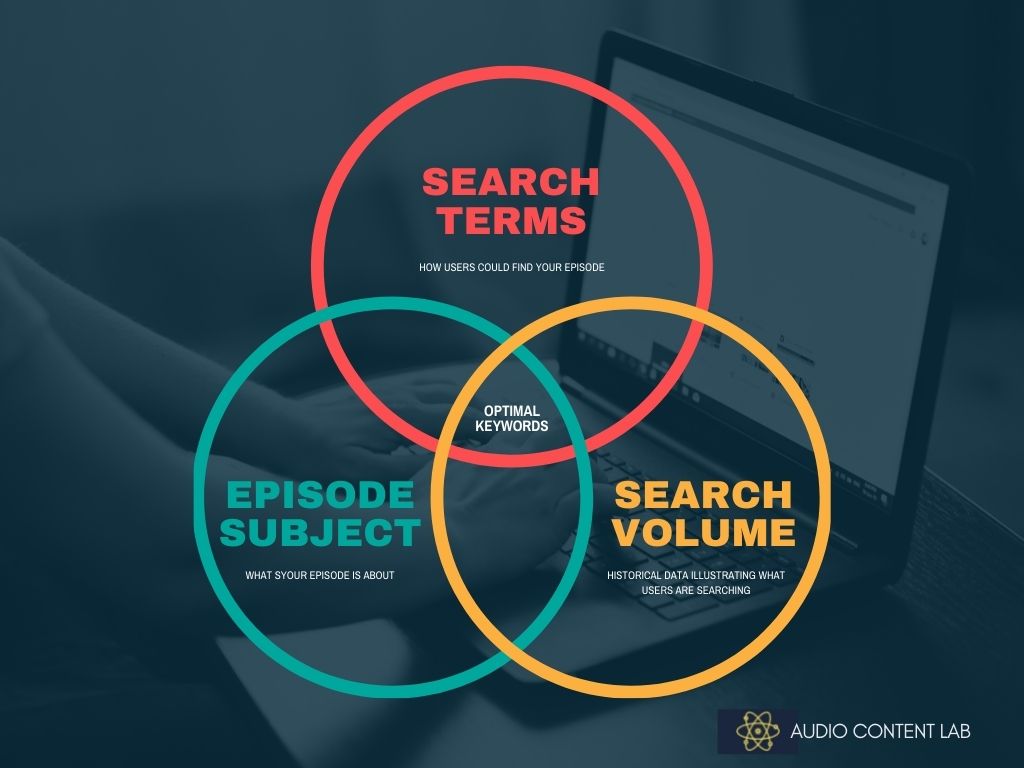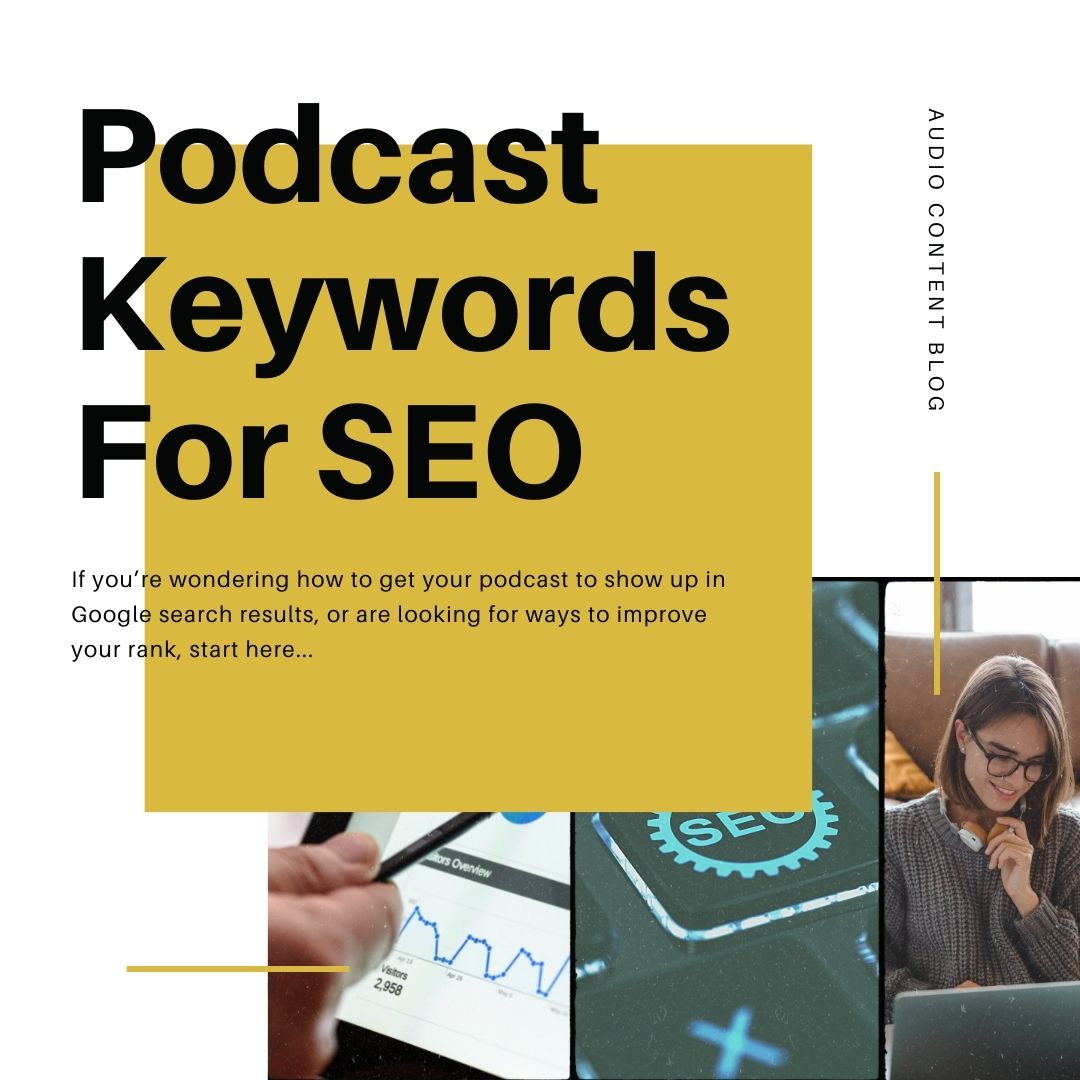A basic but important component of a podcast promotion strategy is making sure it is easy for people to find. While different podcast and music platforms have many category options, often times these are very broad and put too many different subject matters under the same “umbrella” topic. One way to ensure you get found for the correct topics, and more importantly to ensure your podcast episodes are properly indexed by Google, is by using podcast keywords to optimize your content.
We know Google has been adding podcasts to their search results since 2019, and if you use any voice-based search assistant such as Siri or Alexa you understand that being a little more specific can go a long way to getting the results you want, so using keywords is a great way to help listeners find your audio content on various different platforms as well as in Google search results.
Keyword optimizing also provides an addition amount of focus that you can actually control instead of availing yourself to the algorithms and hoping you get listed for the right topics and show up for the relevant search queries. But keyword optimizing for podcasts is a bit of a different discipline than what it would be for written content. If you have a hosted podcast or a Q&A format it can be confusing to try to make your episode conform to a specific phrase or topic, but there are some easy methods and systems you can use to work those keywords in and get the most SEO value from you podcast, and we are going to show you how.
Before we jump in, it is important to note that there are many different methods for doing keyword research, and because of the inherent semi-mystical nature of SEO there can be differing opinions on where and how keywords should be used. Often the answer to those questions of where and how is “it depends” and that’s just table stakes for doing search optimizing. Lower volume search queries will be easier to get rankings and traction for, while higher volume keywords are more competitive and will not be able to rank simply by doing solid on-page optimizing, although having your page set up properly certainly will not hurt.
Get In The Podcast Keyword Zone
You need to find the sweet spot between what your show episode is about, what search term you want to rank for and what related search terms have high volume:

“High volume” can be subjective – the more niche your vertical or podcast subject matter the lower the search volume. This situation is a plus and minus – easy to rank well, but not many user searches. Don’t be discouraged if you find yourself in this situation, because low volume does not necessarily equate to low user intent. A win is a win, so it is still worth it to take advantage and grab some low hanging fruit – it will help your broader podcast SEO strategy when you try to rank more competitive terms.
LET’S MAKE A LIST
If you want to brainstorm and come up with a list on your own, that is fine – but it’s much easier and faster to use a keyword generator for your podcast keywords, and fortunately there’s plenty of free ones out there. Check out:
· Keywordtool.io – https://keywordtool.io/
· Soovle – https://soovle.com/
· SEOBook – http://tools.seobook.com/keyword-list/generator.php
Whichever tool or method you end up using, it is important to not be too judgmental about the relevance of the generated keywords at this stage of the process – one of the biggest mistakes people make doing podcast keyword research is giving value to keywords just because they WANT them to be valuable. Get a list of 25-50 keywords associated with your topic. Some might seem weird or only casually related, but until you get a little further along in the process it is a big mistake to discount anything as being unrelated at this point.
Long tail keywords – phrases that typically contain 4 or more keywords – are sometimes thought of as having supporting roles, but again it depends on what the overall goals and strategies are. While long tail keywords are usually lower volume, they also usually demonstrate higher user intent so don’t feel like you have to limit yourself to phrases that are 3 words or less.
While we are being objective here, it can be helpful to start putting your keywords into categories. Remember, there are typically 3 reasons for an internet search: research, entertainment, and shopping. These are broad enough topics that you are not going to be kneecapping yourself so start categorizing your keywords.
Intent is an important consideration to keep in mind – when a search term on your list is used, what is the intent of the searcher? There are two big categories of search query here – transactional and informational. You may find it easier to go with just these 2 buckets, but it is very dependent upon what your topic is and how diverse your list of keywords is.
CHECK THE KEYWORD VOLUME
Now you have a list! But – we need to determine what the order of importance is, and for that we need to know which one of these keywords gets the most eyes on it, so let’s find the search volume of these keywords. SEMrush is the best tool for this in my opinion, but it is not free. Google Ads Planner is also an option if you are running ads – if you are not they give you a laughably broad and mostly useless (for our purposes here) range. However, there are some great free options that will give you enough info to start making some data-based decisions, such as:
· Keywrodplanner.net – https://keywordplanner.net/
· Linkgraph- https://linkgraph.io/keyword-search-volume/
Once you get your volume data, update your list to include the search volume for each keyword, and organize from highest to lowest.
WHAT ABOUT CPC?
Most of the tools you find will provide CPC (cost-per-click) data in addition to organic volume. This is pulled from Google Ads Planner, and tells you what the average CPC is for the keyword. Remember, this only tells you what people are paying for clicks on a keyword – it does not tell you anything about conversions or anything else, so think of it more like crowd-sourced keyword research and do not overvalue it.
REFINE YOUR LIST
At this point, you should have a list of 25-50 keywords categorized by search type/intent and ranked by volume.
Decision time. Remember our diagram:

You will have to make some tradeoffs to find keywords that are in the “optimal” center of the diagram, but that is normal. For example, there may be higher volume keywords that are less relevant to your subject. All part of the game, and you will probably end up using them at some point anyway as part of a larger SEO strategy so it’s not like your research is for nothing.
Try to find about 5 keywords that hit the target in the middle – your primary focus keyword and then 4 related keywords. Context and relationships are important, and that is why you have 5 keywords – to help demonstrate what context your primary keyword is in relation to the topic and subject matter of the other phrases, and how it relates to those other possible search queries that your additional keywords represent.
Congratulations – you are ready to start optimizing. But this does not mean to just jam those keywords in everywhere possible as often as possible. Readability is a thing, and keyword stuffing is bad. Let’s try and be a little more tactical about this:
Title
This must contain your focus keyword. On the episode page this will be the H1 tag, it must contain the focus keyword. Do not mess around here, this is probably the single most important place to get that keyword in.
Episode Description
Get the focus keyword in the first sentence if possible, but work it in here wherever you can. It will probably be difficult to work the remaining 4 keywords into a character-limited description without compromising readability, but working a couple of them in if you can would be beneficial.
Episode Audio Content
This will be a little easier if you do more scripted content, but you need to try and work in your focus keyword as well as the 4 related keywords that make up your Big 5. If your show is a little less structured – like an interview or call-in format – try just scripting a few questions that contain the keywords. We know this feels like a dirty marketing trick, and it kinda is, but with SEO you are always making tradeoffs and usually they are ethical in nature.
ID3 Tags
The ID3 tags (link ref https://id3.org/) you will most commonly be using for podcasts is title, description, and artwork. Some podcast hosts like Libsyn (link ref https://help.libsynsupport.com/hc/en-us/articles/360040796132-Working-with-ID3-Tags) have options that allow you to use your show information to generate ID3 tags. If you have put the focus keyword in the title and worked a couple of the others into your show description, then you are all set. If you are generating your own ID3 tags, title should contain the focus keyword. If you can work some related keywords in your description, do it.
Metadata
What is podcast metadata? According to Apple, it is “the information that describes your podcast. Some things, like the title and author name, you probably already know. Others, like description and category, should be carefully considered from the perspective of a listener. Providing accurate metadata helps your show appear in relevant user searches and attracts listeners.”
You may have already done all you can with keyword optimizing your episode title and description, but we have found this can be very platform dependent, and any opportunity you have to make sure you are sending the correct signal is not an opportunity to be wasted. You may have additional category or tag options, so if you can work in a keyword or two, do it.
Show Notes
If you include additional information or links to materials referenced in the show in a separate section, it is a great place to use a keyword for an anchor text link.
Episode Page
If you have a dedicated website for your podcast or a specific place on an existing site where you post episodes, then you want the main keyword in the URL of the page. You can also repost your episode description, show notes, transcript etc. here. Since you have previously done your optimizing on those portions of content, you saved yourself some time here. Nice work.
About Transcriptions
Nearly every transcript we have ever worked with has required some editing and clarification so that it is accurate and readable. That being said, altering a transcript so that it radically deviates from the actual audio content is not something we would ever recommend. Ideally you have spoken your target keyword phrase (or multiple phrases) so they occur naturally in your transcription. It may be tempting to try and work your keywords in to the transcript, but it provides little benefit and could hurt your credibility in the long run.
Wrapping It Up
Keywords and SEO may not be top of mind when you are creating a podcast. In fact, it’s probably not a bad thing if it is not, because there are more important things to focus on when you are creating. However, when it comes to promotion, getting a good spot in the search results can help your overall podcast visibility and can bring you new listeners without having to put in too much effort.

